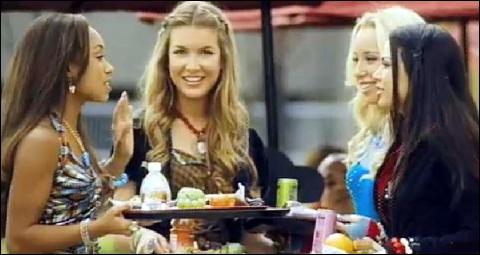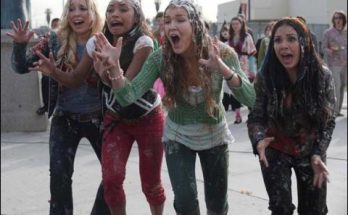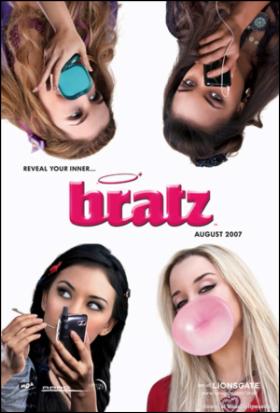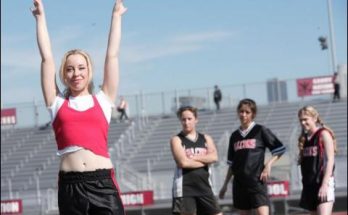Some say that friendship isn’t truly appreciated until it’s tested. This hard lesson certainly isn’t lost on the BRATZ as they navigate their way, individually and collectively, through the trials and tribulations of high school life.
We first encounter the BRATZ getting ready for their first day as freshmen where staying BFFs (Best Friends Forever) is a given between the girls. However, the foursome has never been exposed to the pressures of fitting in and being dictated to by a strict set of social protocol based on cliques.
As the girls expand their horizons, meeting new friends and pursuing their different interests — Jade with her science club, Sasha gets in with the cheerleading squad, Cloe hangs with her soccer team — they soon lose touch with each other. Between homework, socializing and club activities, the BRATZ ‘s friendship falls by the wayside.
Ruling the school like a prison is Principal Dimly (Jon Voight) whose daughter Meredith, embraces the same austere and stern mannerisms of the school’s namesake, Carry Nation. Meredith keeps control of the students by organizing everyone in cliques, and any deviance from her plan unleashes terrifying wrath, where “take no prisoners” is her mantra.
Chelsea gives us a picture on how Meredith sees the world and adjusts her behavior accordingly. “Meredith is student body President, wins the talent show every year and basically the arch-nemesis of the BRATZ. She’s a type-A personality, a perfectionist, highly competitive, insecure about her status and she’ll win at any costs. It’s all about her in her mind. The way she can get control over the students is by the old divide and conquer strategy, she assigns students to specific cliques and makes sure they don’t stray – and it works until the BRATZ get to Carry Nation High.”
As the story unfolds, we skip two years ahead to where the BRATZ are now juniors and barely acknowledge each other. But just as their fates seemed locked, the stars intervene. Cloe unwittingly causes an all out food fight in the courtyard which lands the four girls in detention, the first time in two years that they are together. Initially the detention period starts with them hurtling insults at each other, they’re full of pointing fingers and blaming anyone but themselves for their estrangement. Ironically, it’s Yasmin who’s kept pretty much to herself, who holds up the mirror and reminds them that they were once inseparable, they were once a family, a support system. As the BRATZ do some soul searching they reflect back on what’s happened to them and how did it happen — cliques. The girls vow to never let anyone or anything separate them again. The four girls embark on a mission to unite Carry Nation under one banner, where empowerment means standing up for yourself, for your friends and most of all, recognizing and celebrating diversity.
That sounds easier said than done, especially Meredith feeling her control slipping away, decides to hold nothing back by planning her second Sweet 16 Party, hosted by none other than MTV. It’s at this party where the BRATZ’s friendship is truly put the test.
“We have a tendency as humans to put each other down and it’s a way to elevate ourselves and this movie fights all that,” says Arad. “The most important element in this kind of movie is wish fulfillment, live out your dream but really live it out. Give it a shot!
It’s also about diversity and discrimination. Discrimination doesn’t have to be heavy-handed, it can be not being given the opportunity to do what you really want. We have a bunch of girls who learn very quickly that the best thing they have is their friendship and their trust in each other. It’s like that line, ‘United We Stand, Divided We Fall.”
As McNamara explains, the story drew on the personal experiences of the filmmakers as they recounted to each other their own memories of high school and fitting in.
“The producers, writers and I hung out and talked about the fact that we had all lost friendships during high school, not because you want to but you start meeting new people and start hanging out with people that are into the same things as you,” says McNamara.
“This theme of cliques still happens even when you grow up, it’s in the business world — hey they are everywhere. I think that’s what I’m trying to say with this movie is that you don’t have to be part of a clique exclusively. You can have friends all over the place and still be with kids that are into what you’re into…be with your jock friends, your science friends, whomever.”
“We talk a lot about cliques in this movie,” says Janel Parrish who plays Jade. “Not necessarily to cut down them down but to show that they do exist and you don’t necessarily have to belong to one. I know when I was in high school I didn’t belong to a clique. I had friends that were in band, that were cheerleaders, science club. There are a lot of pressures in high school for young girls to belong to a clique and to have a certain place. But this movie shows that you just have to be yourself, no matter what. You don’t have to always be what you think other people want you to be.”
Nathalia being in high school herself says the story definitely speaks in an authentic voice. “This movie is spot on about hitting real issues. I recently made the transition into high school and I know how hard it is. A very similar thing happened to me with my best friend. We’d been in separable since second grade but once we got to high school we started hanging out with different kids and before you know it we didn’t see each other at all,” says the fifteen-year old.
Arad reinforces this idea of celebrating differences and not limiting yourself to just those that you feel are like you.
“It’s okay if you hang out with the dyno-guys or cheerleaders…you’re entitled to that and you should — these are people you have something in common with. But it doesn’t mean that there are social barriers there. Give someone a chance and you’ll find out you have more in common that not.
“Cliques are something to overcome in this world — that’s the social system and if we can unite kids without taking away their individuality, that’s fantastic.
Logan Browning feels very passionate about the opportunity to reach young people at a particularly important time in their lives. “Each of the BRATZ girls has a very different family background and a very different clique they are drawn to so I think everyone will relate to that. Friendships are so important because you can think that you can go to school and be by yourself and be the coolest girl but without true friends, you’re going to be stuck in your life.
“This movie will help young girls see that nobody has the perfect life. People live differently. It’s the 21st century and anything can happen and this movie really helps young girls open up their eyes and to see that — we are all different, we’re not supposed to be the same. That’s what makes you special,” says Logan.
Next Page: All About Bratitude
Views: 60



